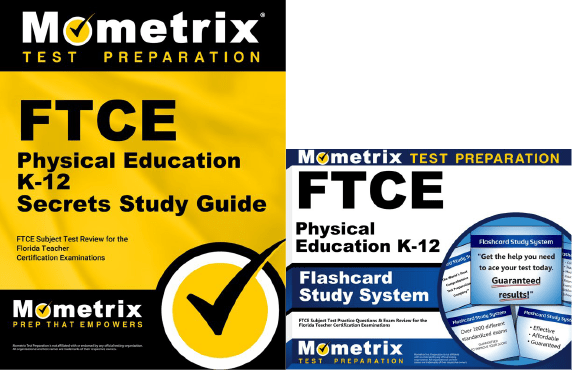If you need help studying for the FTCE Physical Education test or just want some more information about what the test is like, you’ve come to the right place!
Click below to take a free FTCE Physical Education practice test!
What’s on the Test?
The FTCE Physical Education test contains 80 multiple-choice questions and is timed at 2.5 hours.
The exam is split into 13 competencies:
1. The history and philosophy of the physical education profession
3% of the exam
- Historical events and trends that have influenced the physical education profession
- The relation of physical education goals and values to the philosophies of education
2. Physical education curriculum development
10% of the exam
- Characteristics of various curriculum models
- Various factors to consider in curriculum planning
- Designing and developing curricula using national and state documents, standards, and benchmarks
- Long-term and short-term planning
- Cross-curricular content and concepts
3. Developmentally appropriate instructional strategies
13% of the exam
- Addressing the diverse needs of all students
- Teaching styles, communication delivery systems, and materials that facilitate learning
- Motivational theories and techniques
- Developmentally appropriate instructional strategies and teaching methods
- Feedback as a strategy to facilitate learning
- Differentiated instructional practices
4. Human growth and development and motor learning
8% of the exam
- Developmentally appropriate practices
- Constructing a positive learning environment that supports affective, psychomotor, and cognitive development
- Principles of motor development and motor learning
- Principles of sequential progression of motor skills development
5. Developmentally appropriate movement skills and concepts
12% of the exam
- Movement concepts pertaining to physical education
- Locomotor, nonlocomotor, and manipulative skills
- Sequentially progressive activities
- Appropriate cues and prompts for teaching movement skills
- Mechanical principles of motion
- Identifying ways in which students can improve performance
- The effect of skill-related fitness on performance
6. Lifetime health, wellness, and physical fitness
12% of the exam
- Analyzing data from physical fitness assessments
- Health-related components of a personal fitness program
- Nutrition and exercise
- Health benefits and risks pertaining to physical activity
- Training principles and guidelines to improve personal fitness
- Exercises that benefit the major muscle groups
- Adaptation of human body systems to physical activity
- Contributions of physical education to health, wellness, and physical fitness
- Opportunities for participation in various physical activities
7. Cognitive, social, and emotional development through physical education and physical activity
7% of the exam
- The role physical education plays in developing an understanding of diversity
- The role physical education plays in developing responsible behaviors
- Intellectual, psychological, and sociological benefits of physical activities
- Major factors associated with developing social and emotional health through physical activity
8. Various types of assessment strategies
10% of the exam
- Assessment strategies for appropriate use within the cognitive, affective, and psychomotor domains
- Curriculum design, lesson planning, and program evaluation
- Assessment strategies that support an inclusive environment
- Physical fitness assessment strategies
9. Strategies that promote an effective learning environment
7% of the exam
- Selecting and maintaining appropriate equipment and facilities
- Creating and sustaining an effective learning environment
- Supervisory and behavioral management techniques
- Appropriate action for injury care and prevention
10. Laws, legislation, and liabilities that pertain to physical education
4% of the exam
- State and federal legislation that impacts physical education
- Legal liabilities that pertain to physical education
11. Appropriate safety considerations, rules, strategies, and terminology
5% of the exam
- Game and sport rules and strategies
- Terminology for physical education and activities
- Safety considerations for various physical activities
12. Professional ethics, advocacy, and development
4% of the exam
- Enhancing teacher effectiveness, promoting collaboration, and improving student performance
- Enhancing your continuous improvement via professional organizations and literature
- Advocating for physical education
13. Appropriate use of technology as related to physical education
5% of the exam
- Appropriate uses of technology in the instructional process
- Appropriate use of technology in assessing student performance
- Technology that supports cross-curricular learning
- Ways that students can use technology in physical education
How to Register
To get started with the registration process, you’ll need to create an FTCE/FELE account on their website. You can then register for the exam via your account.
The testing fee is $150.
How the Exam is Scored
The FTCE Physical Education test is scored using a scaled scoring method. Here’s how it works:
For every question you answer correctly, you get one point added to your raw score. At the end of the test, your final raw score will be converted to a scaled score. You’ll need a scaled score of at least 200 to pass the exam.
The reason your raw score is converted to a scaled score is because everyone that takes the test is given a slightly different set of questions. Since everyone has a different arrangement of questions, and because some questions are harder than others, converting your raw score to a scaled score ensures a more even playing field.
FAQs
How many questions are on the FTCE Physical Education K-12 exam?
The exam contains 80 questions.
What is the time limit for the FTCE Physical Education K-12 exam?
The exam is timed at 2.5 hours.
What is the passing score for the FTCE Physical Education K-12 exam?
You’ll need to get a final scaled score of at least 200 to pass.
How much does the FTCE Physical Education K-12 exam cost?
The testing fee is $150.



 FTCE Study Guide
FTCE Study Guide FTCE Flashcards
FTCE Flashcards